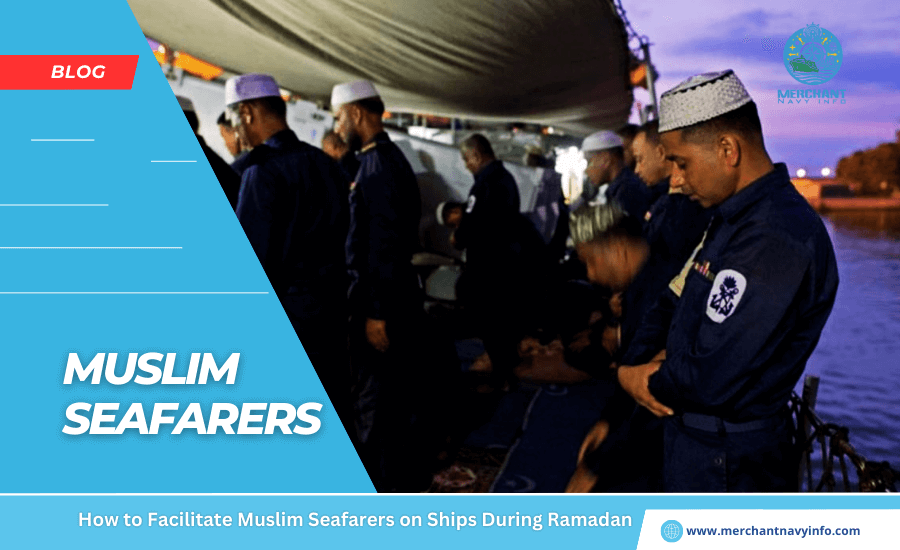
Shipping companies can take a number of measures to facilitate Muslim seafarers‘ stay on ships during Ramadan while monitoring ship operations, workloads, policies, and ship safety. Ensure that safety regulations are complied with. Shipping companies must ensure that all religious considerations and adjustments are made in accordance with safety regulations. Any adjustments must not jeopardize the safety of the vessel or its crew.
Muslims around the world observe Ramadan, the ninth month of the Islamic calendar, as a time of prayer, fasting (soum), reflection, and community. This month is one of the holiest for Muslims and is characterized by a period of fasting, which is considered one of the five pillars of Islam. Muslims eat suhoor or sehri, the early morning meal before sunrise. They abstain from all food and drink, including water, until iftar, the evening meal that breaks the fast. Only healthy people should fast.
Certain Muslims are Exempt
- People who are sick or infirm and whose health is affected by fasting.
- Young people who have not yet reached puberty – Some people begin fasting before this age.
- Pregnant and lactating women.
- Menstruating women.
- Traveler.
- Elderly or frail people who cannot fast for long periods of time.
Meals
Provide meals to fasting Muslim sailors before and after dark. Fasting during Ramadan involves refraining from eating and drinking from dawn to dusk. Providing meals before and after dark (sehri and iftar), sehri (meals before sunrise) and iftar (meals after sunset) to enable Muslim sailors to travel by ship during Ramadan helps Muslim sailors maintain energy levels and health while fasting.
Rest Time
Allow Muslim sailors to rest during the day and avoid physically demanding work during Lent. Fasting is both physically and mentally taxing, so Muslim sailors may need extra rest and time to recharge during the day.
Space for breaking the fast
Providing a designated space for Muslim seafarers to break their fast together: Breaking the fast is traditionally celebrated with family and friends and is a gathering place for Muslim seafarers. It helps foster a sense of community and support by providing a designated space to break the fast.
Prayer and Meal Times
Please note the prayer and meal time schedule during Ramadan. Muslim sailors are required to pray at specific times throughout the day, and meal times are also determined by the timing of their daily fasts.
Fatigue and Weakness
Provides additional support for Muslim seafarers who may be experiencing fatigue and weakness from fasting. Fasting can be difficult, especially for those who are new to it. Providing additional support and encouragement to Muslim seafarers during Ramadan will help them stay healthy and focused.
Inclusive Environment
Promote a respectful and inclusive environment that respects Muslim customs during Ramadan. Masters must ensure an environment that welcomes and respects Muslim seafarers and their religious practices during Ramadan.
Planning events and activities
Avoid planning events and activities that are inconsistent with Islamic customs during Ramadan: Ship captains must avoid planning events and activities that are inconsistent with Islamic customs during Ramadan. Please be aware of this, which should be supported.
Medical Assistance
Be prepared to provide medical care and accommodation, if necessary, to Muslim seafarers who are fasting. Muslim seafarers who are fasting may require additional medical care and accommodation to ensure their health and safety.
Taraweeh Prayer
Allowing Muslim Sailors Time to Perform Taraweeh Prayers at Night: Taraweeh prayers are performed after daily fasting and are an important part of Ramadan. Giving Muslim seafarers time to pray these prayers allows them to feel supported and respected.
Religious Resources:
Ensuring Muslim Seafarers have Access to Religious Resources such as the Quran and Prayer Mats: Access to Religious Resources Will Ensure Muslim Seafarers Have Access to Religious Resources such as the Quran and Prayer Mats: It helps you feel more connected.
Work Break
Allows Muslim seafarers to take breaks for personal reflection and prayer during Ramadan. Muslim seafarers may require additional time for personal reflection and prayer during Ramadan. Giving them breaks when needed will help support their religious practices.
Iftar Arrangements
Consider planning a special iftar celebration to mark the end of your daily fast. Special iftar celebrations help foster a sense of community and support for Muslim seafarers during Ramadan.
Respecting Religious Practices
Encourage all crew members to learn about and respect Islamic practices during Ramadan. Promoting an environment of cultural exchange and understanding will help all crew members learn about and respect Islamic customs during Ramadan.
Work Schedule
Be understanding and flexible with your plans and work assignments during Ramadan. Masters must be understanding and flexible with planning and work assignments during Ramadan, taking into account the needs and customs of Muslim seafarers.
Don’t jeopardize your security.
Don’t let religious accommodations jeopardize your safety. When considering religious practices, it is important to ensure that these accommodations do not endanger the safety of the ship or its crew. For example, designated prayer areas must not obstruct emergency exits or security features.
Providing Training and Education
It is important to provide training and education to all crew members regarding the religious practices and needs of Muslim seafarers during Ramadan. This helps promote cultural exchange and understanding while ensuring compliance with safety guidelines.
Health Precautions
Whether it is safe for Muslim seafarers to fast on board during the month of Ramadan depends on many factors, including their personal health, the nature of their work on board, and government policies and precautions. It will be decided. Shipping company and captain.
Fasting during Ramadan requires refraining from eating and drinking from dawn to dusk, which can lead to dehydration and hypoglycemia, especially in hot and humid conditions. For this reason, Muslim seafarers should consult and obtain medical clearance before deciding to fast on board during Ramadan, and captains should ensure that Muslim seafarers fast during Ramadan. This must be taken into account to facilitate navigation on vessels inside.









